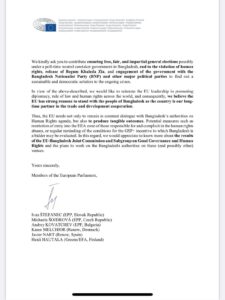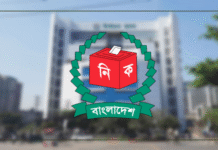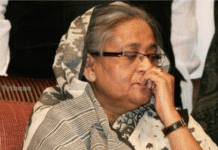Express concern over rights situation; ask for initiatives to release Khaleda Zia, holding national elections under caretaker govt
Muktadir Rashid | New Age Jun 13,2023 |
 Six European parliamentarians in a joint letter on Monday urged the High Representative of the parliament for taking actions to restore democracy in Bangladesh.
Six European parliamentarians in a joint letter on Monday urged the High Representative of the parliament for taking actions to restore democracy in Bangladesh.
The letter to Josep Borrell, also the vice-president of the European Commission, urged him for taking initiatives to ensure release of Bangladesh Nationalist Party chairperson Khaleda Zia, holding the upcoming national elections under caretaker govt, end to the violation of human rights and engagement of the government with the Bangladesh Nationalist Party and other major political parties to find out a sustainable and democratic solution to the ongoing crises.
The signatories in the letter are Ivan ŠTEFANEC (EPP, Slovak Republic), Michaela ŠOJDROVÁ (EPP, Czech Republic), Andrey KOVATCHEV (EPP, Bulgaria) and Karen MELCHIOR (Renew, Denmark), Javier NART (Renew, Spain), and Heidi HAUTALA (Greens/EFA, Finland).
The office of Ivan ŠTEFANEC, responding to an email from New Age, confirmed the authenticity of the letter on early Tuesday ( Bangladesh time).
‘With this letter, we would like to express our concerns about the violation of human rights in Bangladesh, and call to restore democracy and the rule of law in Bangladesh in view of its upcoming general elections,’ the joint letter read.
‘Current government of Prime Minister Sheikh Hasina Wazad of Bangladesh, in power since 2009, has curtailed the democratic space for the citizens and failed to show respect to their fundamental rights guaranteed by the constitution. To consolidate its powers, the regime has been resorting to extrajudicial killings, abductions, tortures and false cases against the leaders and activists of the opposition political parties,’ said the letter.
It alleged that the freedom of expression including the freedom of press had undermined in recent years, most notably since the enactment of the Digital Security Act 2018.
‘Allegations of custodial torture and other ill-treatment remained common, often in connection to the Bangladesh’s Rapid Action Battalion (RAB). The abuse has not been restricted only to the government’s political opponents, but to the ethnic and religious minorities as well, including the minority Christian population in Bangladesh,’ the letter said.
High rates of extrajudicial executions and enforced disappearances in the past decade continued to garner national and international concern, including from UN human rights, mechanisms such as the UN Committee against Torture (CAT). During her visit to Bangladesh, the UN High Commissioner for Human Rights (OHCHR) called on the government to ratify the Convention for the Protection of All Persons from Enforced Disappearance, said the letter.
‘We would like to emphasise the importance to focus on the upcoming 12th general elections in the country, which are expected to take place in the end of 2023 or in the beginning of 2024,’ it said.
‘We must bear in mind that the right of the people to choose their representatives is yet to be determined as no mechanism is in place for acceptable elections in the country. This is a problem, as riggings, manipulations, and non-attendance of the voters marred the 10th and 11th parliamentary elections’ the letter said.
‘While 10th general elections were non-participatory with the major political parties including the Bangladesh nationalist Party (BNP) boycotting the polls, the 11th (popularly known as Midnight Election) was concluded in the night before. Consequently, the governments have had no or little mandate from the people of Bangladesh and have failed to gain the approval of the international community,’ the letter said.
‘We kindly ask you to contribute ensuring free, fair, and impartial general elections possibly under a poll-time neutral caretaker government in Bangladesh, end to the violation of human rights, release of Begum Khaleda Zia, and engagement of the government with the Bangladesh Nationalist Party (BNP) and other major political parties to find out a sustainable and democratic solution to the ongoing crises,’ it said.
‘In view of the above-described, we would like to reiterate the EU leadership in promoting diplomacy, rule of law and human rights across the world, and consequently, we believe the EU has strong reasons to stand with the people of Bangladesh as the country is our long-time partner in the trade and development cooperation,’ the statement said.
‘Thus, the EU needs not only to remain in constant dialogue with Bangladesh’s authorities on Human Rights agenda, but also to produce tangible outcomes. Potential measures such as restriction of entry into the EEA zone of those responsible for and complicit in the human rights abuses, or regular reminding of the conditions for the GSP+ incentive to which Bangladesh is a bidder may be evaluated. In this regard, we would appreciate to know more about the resultsof the EU-Bangladesh Joint Commission and Subgroup on Good Governance and Human Rights and the plans to work on the Bangladeshi authorities on these (and possibly other) venues,’ the letter concluded.











